For the past eight seasons, Dustin Byfuglien has been — both literally and figuratively — a huge part of the Winnipeg Jets’ D-corps.
However, with the 6-foot-5, 260-pound blueliner taking a leave of absence earlier this month and pondering walking away from the game entirely, the Jets might lose “Big Buff” for good.
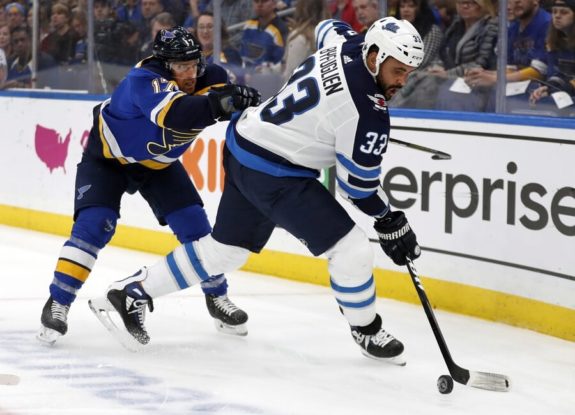
Retiring early — with two years left on his contract — would certainly have a huge impact on the 2019-20 Jets and cast a shadow over the Byfuglien’s eventual legacy in Winnipeg.
There’s No One Quite Like Byfuglien
Dustin Byfuglien has a skillset unlike any other NHL defenseman. Quite simply, he’s been “the great equalizer” who has the ability to fundamentally and drastically change the Jets’ defensive and on-ice dynamic. When he returned from injury this past April, we explored in detail all the ways he boosts the Jets’ chance to win.
Related: Jets Get Big Boost with Byfuglien’s Return
To summarize, over his 528 regular season and 27 playoff games in a Jets’ jersey, the alternate captain since the very beginning and one of the franchise’s most familiar faces has changed the momentum with his ferocious brand of physicality, his signature point cannon, and power-play prowess, but that’s not all.
His reputation and alone has impacted the way opponents play. Known as one of the NHL’s hardest hitters — he’s dished out nearly 2000 hits in his career — forwards attempted controlled entries less frequently on Byfuglien than any other Jets’ D-man last season, no doubt fearing they’d get obliterated like Mark Stone if they dare carry it in. Fewer controlled entries means fewer high-danger scoring chances against.
At the end of his career, whether that’s imminent or a few years off, Byfuglien will definitely be remembered for the utter uniqueness of his game — for better and for worse. No one will ever be able to call his playstyle boring: his penchant for stepping up in plays, leading rushes, and taking the puck behind the net with one hand on his stick, has equally entertained and frustrated onlookers.
It’s worth noting Byfuglien, over the past few seasons, has played much more responsibly and hasn’t left his D-partners hanging out to dry nearly as often as in the early days of the Jets 2.0. Back then, he played a riskier game — which often made him a target for criticism — as there was more of an expectation on him to produce offence.
Lastly, Byfuglien will be remembered for, as the Winnipeg Free Press’ Mike McIntyre put it, doing it all with “a huge smile on his face” and for having “one of the biggest personalities in the NHL.” (from ‘Big Buff retirement rumours hit full stride,’ Winnipeg Free Press, 09/18/19.)
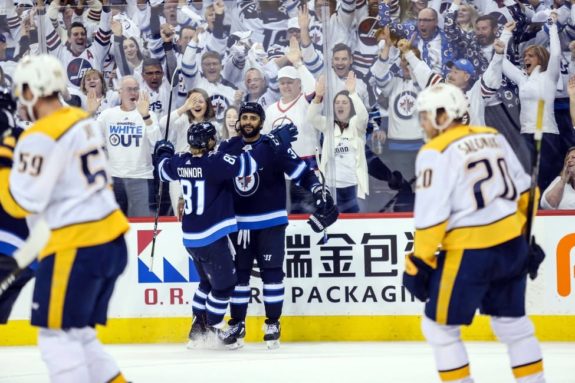
He’s jammed along to tunes while in the penalty box; he’s dabbed and danced to celebrate goals; he’s plucked two opponents out of a scrum simultaneously like a bouncer breaking up a bar fight. He’s been fun to watch.
Retiring Early Would Complicate Legacy
Indeed, there will be many reasons to remember the D-man fondly when his career is over. However, if he chooses to walk away now with two years left on his current contract, it will stain his lily-white legacy.
A Byfuglien retirement would come at the worst possible time. He was expected to be a bigger part of any success than ever before: with Ben Chiarot, Jacob Trouba, and Tyler Myers all departing the Jets’ back-end, it was already one of the biggest question marks coming into the season.
Related: Jets Preseason: 3 Storylines to Watch
Losing Byfuglien in addition to those three would have huge ramifications on an already depleted D-corp and could very well be the death knell on the team’s playoff chances.
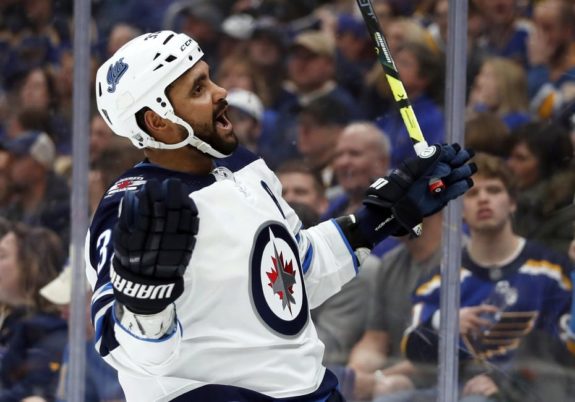
We saw how upset Indianapolis Colts fans were and how disrespected they felt after their star quarterback, Andrew Luck, shocked the NFL last month by retiring at age 29 just weeks before the regular season kicked off.
A contingency of Jets fans would likely feel the same as Colts fans who booed Luck as he left the field in August: it’s understandable some will feel as though Byfuglien left the team in the lurch when it needed him the most.
It’s undoubtedly true — the beginning of training camp is not the best time to spring on your club you might not want to play anymore. If he retires, the $14 million the Jets owe him would come off the books, but the extra cap space may not be helpful at this, the eleventh hour.
If Byfuglien had let the team know a few months ago, general manager Kevin Cheveldayoff may have tried harder to retain Chiarot or Myers, gone after a free agent such as Jake Gardiner or Kevin Shattenkirk, or at least tried to ink an affordable veteran.
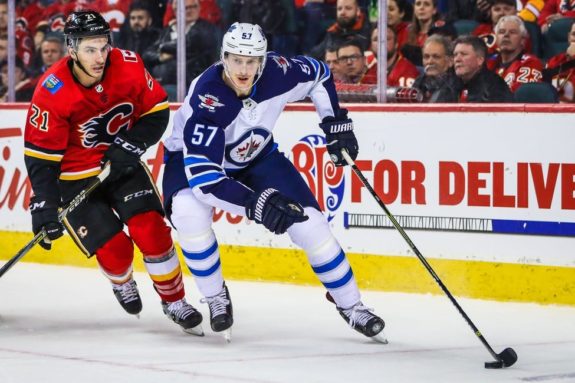
None of that’s possible anymore, of course: Chiarot signed with the Montreal Canadiens, Myers signed with the Vancouver Canucks, Gardiner signed with the Carolina Hurricanes, and Shattenkirk signed with the Tampa Bay Lightning.
Decision is Byfuglien’s Alone to Make
At the end of the day, it’s up to Byfuglien alone to make the decision that’s best for his long-term well-being and for his family’s (he’s married with three children) future. The circumstances that have led him to take the leave of absence and ponder walking away from the game at age 34 are no one’s business but his own. Whatever the reason(s) is/are, head coach Paul Maurice has refused to comment on speculation.
It’s not as though Byfuglien needs the money: he’s made more than $66 million over his 14 NHL seasons. Given his love for the outdoors, hunting, and fishing, he’d likely be just as happy living in a cabin in the woods as he would be living in a multi-million dollar mansion. It’s not as though he has anything to prove, either: he has his name on the Stanley Cup and has posted 525 points in 869 career games.
If he no longer desires to subject himself to the rigours of gruelling 82-game grinds — especially in the wake of a 2018-19 season where he was limited to 42 games due to a variety of injuries — that’s solely up to him. As The Athletic’s Murat Ates puts it, “he has earned the right to make a decision this foundational to his life in peace.”
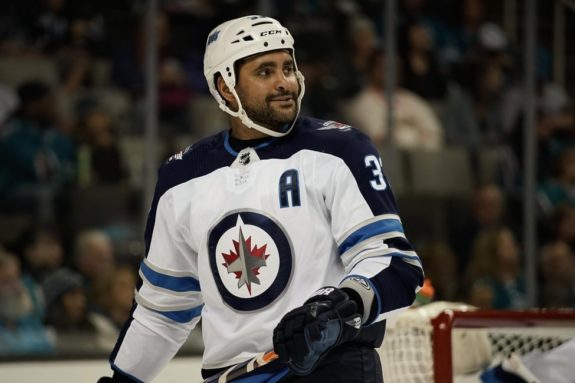
What’s not solely up to Byfuglien is how fans perceive his choice: there would be a contingency who see the retirement as a betrayal, would throw away their jerseys, would never forgive him. As the ones who pay hundreds to get into Bell MTS Place and cheer their team on, it’s their right to react however they like.
Unfortunately, the Jets will be a worse team in 2019-20 without the Minnesotan if Byfuglien hangs them up than they will be if he decides to lace them up again. He’s gobbled up 24-plus minutes in each of his past four seasons, he’s far more experienced than any other D-man, and is the team’s all-time leader in points by a defenseman by more than 100.
Byfuglien’s skillset, personality, and ability to take a game over are things that the Jets may never be able to replace, let alone in the few weeks before games start counting for real.